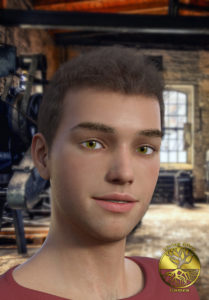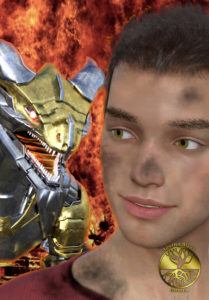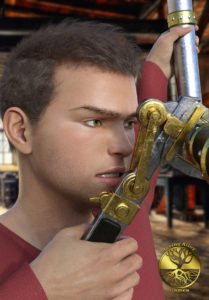Arthur’s Story
Arthur thumped his hefty suitcase in the forward cabin of the auto-carriage forcefully — but not too forcefully, the swarm had fragile bits, after all — and sulked in the seat next to his partner for the night.
“Why so glum, lad?” asked the ever-jovial Professor Octavius Lyrn as he put the carriage into gear and it lurched back into the street. “We have a positively delightful evening ahead of us! Pitting my dragon against a vanguard? Beats drinks at my club any time!”
Glaring at Octavius, Arthur bit back his first retorts. “You, Professor, may have had a free evening, but I have a test to study for! How am I supposed to get a First if I keep getting pulled off on these stupid jobs?”
“My dear boy,” Octavius replied, raising an incredulous eyebrow, “One day you will realize that hardly anyone outside of the Academy gives two chits about Firsts, or any of our rankings, for that matter. Everyone already knows you’re a prodigy — you could fail every course and people would still vie for your creations, so all that extra studying for the sake of an obscure trick question is gaining you absolutely nothing. In fact, I rather suspect the Guildmaster is giving you more jobs because he wants you to stop bothering with theory and spend your time on practical application.”
Arthur’s jaw dropped. This, from a professor? “But top marks mean everything! Prestige, career prospects, connections . . .”
“Connections?” Octavius scoffed. “Tell me, Arthur, how many connections are you getting with your nose stuck in a book compared to, say, Leo?”
That struck a nerve. Arthur glared out the carriage window as they veered around a sharp corner. Leo was brilliant, but lazy. But because he was so bloody charming, everyone wanted him on their projects and he already had three major manufacturers jockeying for him.
Professor Lyrn patted Arthur’s knee. “Don’t look so down, lad — you don’t want to be Leo, either. Study enough to make you as effective as possible, but stop wasting your time pursuing your professor’s minutiae.”
“Even yours?” Arthur shot back.
“Especially mine! In fact, if you get every answer correct on my next test, I’ll fail you on principle! Ah good, we’re here.” Octavius announced, hopping out of the auto-carriage like a man 20 years his junior.
The two men walked to the cargo hold of the carriage and Arthur helped his professor light Octavius’ iron dragon to life. The mechanical creature was the size of a particularly bulky clydesdale, emitted nasty chemical fires from both ends, and had diamond tipped claws that could rip through doors or even walls, if needed.
“Why did you ask me to bring my swarm instead of my own dragon?” Arthur asked.
“Because that vanguard would have a much easier time against two foes — no matter how overpowered — than against a multitude of tiny foes to run its defenses thin and one large one performing the main attacks.”
White, ivorite-fueled smoke wafted from the dragon’s mouth and it began stretching its limbs, eventually shaking its head like a dog. The professor gave it a fond pat and the two men exited the carriage, the dragon following. They nodded at the driver of a salvage truck as he pulled up, already looking bored. Professor Octavius couldn’t care less about recovering technology from defeated machines, but Arthur did, and Octavius always arranged for someone to drag the metal carcasses to his workshop, where Arthur would spend hours stripping them down for usable parts.
The two walked in silence towards the factory, observing smoke billowing out a few southern-facing windows. A continual banging sound with occasional shrieks of metal lilted from the building. They passed through a set of reinforced steel doors that had been shredded to make way for the metal behemoth tumbling around the half-trashed factory.
This vanguard was a six meter tall steel orb with eight tentacles — four for walking, four with giant spears or barbed tips for climbing and destroying. The vanguard currently had its tentacles wrapped around some piping systems like a snake, constricting and twisting until the pipes wrenched free and steam squealed from their ends. It had probably been sent by a rival manufacturer to undercut their competition. What a waste of an automaton. Arthur picked up some stamped gears strewn across the ground and sighed when he saw the insignia.
Dag nab it. Thompson metalworks. They had the most consistent tooling and basic parts in the city. Arthur would have to deal with shoddy parts for months!
“Let’s take this thing down,” he said, flicking open his case to reveal his clockwork swarm. The insectile machines flew straight towards the vanguard as Arthur turned each one on. The vanguard pulled away from the boiler system, swatting wildly as twenty tiny machines swarmed its optical sensors, overwhelming its ability to see. This opened it up for attack by the iron dragon, which had bounded up and belched fire at the tentacles’ connecting points. Each burst of flame left scorch marks and acid streaks across the vanguard’s metal. Octavius leaned against the wall, knowing this would take a few minutes. Though the dragon could spit fire with perfect accuracy (as the vanguard’s flailing proved a useless defense) it would take time for the heat and acid to render its limbs inert.
Which was why his mouth dropped in shock when an electrical charge swept over the vanguard and it keeled over, motionless.
“What do you suppose happened?” Octavius asked.
Arthur allowed himself a small smile and responded, “Take a look.”
Octavius raised his eyebrows at Arthur and stepped over to the vanguard, brushing away the swarm as it flew past him, back to Arthur’s waiting hand.
The professor took one look at the back of the vanguard and burst into laughter, clapping his hands. “Wonderful! When did you add that feature?” he asked, peeking through the still steaming hole.
“I got the idea from one of Professor Rayne’s ‘minutiae’ questions,” Arthur replied, shutting off each insect and carefully stowing it in his case. “It didn’t take much work to add energy into a cutter for some, and a power surge that will fry most electrical systems in others. That way they can take on most machines — whether steam or electric powered.”
Octavius shook his head, still chuckling. “Your gift is wasted in the classroom, Arthur. I don’t know why you don’t just quit school and work for the guilds.”
“I don’t want to work for the guilds,” Arthur spit out, snapping his case shut. “The moment my debt is paid, I’m out.”
Octavius burst out laughing. “Poor, naive, child,” he said. “Haven’t you realized you’re never going to pay that debt? You’re a prostitute.”
Arthur bolted upright, cheeks flaming. “I am not- I’ve never – How dare you insinuate-” he sputtered.
The professor patted Arthur’s shoulder. “Not in the carnal sense, of course not, but you do know how they keep prostitutes from leaving, don’t you?”
“They pay them. Unlike me,” Arthur bit off, bitterly.
“Tosh,” the older man replied with a patronizing look. “Yes, those girls get paid a pittance for their ‘services,’ but they usually go to the brothels because of some sort of debt. They work for years to pay it off, only to find that when they think they are finally done, they’ve been charged exorbitant fees for their coffin rooms, scant food, and cheap clothes – higher fees than they could earn even if they serviced johns nonstop without sleep.”
“So tell me,” Octavius said, leaning forward. “How, on your bookkeeper mother’s salary, do you manage to pay your father’s debts and your tuition and book fees — not to mention all the specialty supplies required for your ingenious devices? Your mother may believe your I-got-help-from-my-uncle line, but no one else does.”
Arthur froze, staring into his professor’s stern eyes.
“You knew?” he whispered.
Everyone had seen Arthur Steam was a prodigy and had the potential to become one of the world’s foremost inventors. So his parents had taken on massive debts to hire specialized tutors and sent him to Gearhaven Academy as a young teen, barely keeping afloat until the fortune Arthur would make on his inventions solved all their financial woes. But when Arthur’s father got killed in the war, the Guilds called the debt due — either Arthur start working for them, or they’d sell his mother in one of the far-off countries that still took slaves.
“It wasn’t hard to figure out,” Octavius said gently, handing Arthur his case. “It’s also not hard to figure out they’ll never let you go.”
“You see,” Octavius continued, leading Arthur back to the auto-carriage, “someone like me, they don’t need to threaten. So long as they get me the otherwise unobtainable goods I want, I do the jobs they want, simple business transactions. You, if you want to get out, to live life above board, you’ll never do it trying to play by their rules. You’ll need to outwit them, my boy — which will never happen if you spend all your time trying to hand in perfect assignments to every professor and guildmaster that crosses your way.”
“So just stop doing anything and fail,” Arthur replied. “What could go wrong with that plan?”
“Of course not!” Octavius said. “Do the bare minimum for everyone else, and save the overachieving for you,” he said, jabbing Arthur’s chest with his forefinger. The two men loaded their machines in the back of the carriage and gave a quick wave to the salvagers before driving away. Arthur eyed his mentor at the wheel. Octavius was right. He would never give any real help, of course. Professor Lyrn was too selfish to endanger his status with the guilds. But there was another guild agent who Arthur knew was just as desperate to get out as he was.
It seemed high time for Arthur to take a class from Professor Cole . . .



